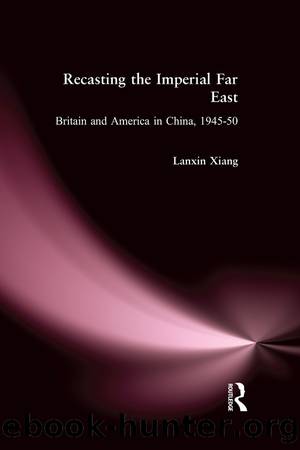Recasting the Imperial Far East: Britain and America in China, 1945-50 by Lanxin Xiang

Author:Lanxin Xiang [Xiang, Lanxin]
Language: eng
Format: epub
Tags: History, General, Political Science, Public Policy, Social Services & Welfare
ISBN: 9781315482873
Google: bLwYDQAAQBAJ
Publisher: Routledge
Published: 2016-09-17T16:18:51+00:00
It is clear that the Marshall-Vincent policy by no means indicated total disengagement from China. However, it did indicate a strong unwillingness to pay for a policy of all-out commitment. Shortly before his departure from the Far Eastern Office, Vincent elaborated his long-term view about the American China policy to Secretary Marshall: âWith regard to general policy on the question of economic aid to China I tend more and more to the belief that, while continuing efforts to contain the spread of Communism in China without becoming directly involved in the civil war, the grass roots and strength of our relations with China over the past 100 years derive from American commercial and cultural activities in the country With this thought in mind, I believe we should do all that we reasonably can to strengthen American business and cultural enterprise in the country. Specific projects should be considered in the light of their relation to strengthening American business in places [where] we may reasonably expect operations not to be completely at the mercy of the vicissitudes of civil war or of the vagaries of the present National administration.â Vincent thus concluded that if the Americans built up enclaves of increasing influence in such places as Shanghai and Tsingtao, the effect could gradually spread and benefit wider areas and perhaps lead to more extensive economic assistance, which the U.S. government could then justify in the eyes of the American people as sound American policy.74 Vincent was clearly concerned about continued American engagement in China over the long run, which at the time could be ruined by shortsighted anti-Communist fervor in the United States.
The British had similar concerns. In sharp contrast to the silent attitude of the British in 1946, the desire to restore the British position in China was frequently voiced in Great Britain throughout 1947. In April, for example, the Manchester Guardian called for a more energetic and comprehensive British policy toward China.75 During a parliamentary debate on 22 April, Sir Ralph Glyn, a Conservative M.P., asked the foreign secretary whether or not it was still the policy of His Majestyâs Government toward China to assist, when conditions improved, in carrying out other projects unrelated to civil strife, to encourage economic reconstruction and reform in China, and thus to promote a general revival of commercial relations. Christopher May-hew, parliamentary undersecretary, replied, âYes, sir, but any projects must be considered in relation to H.M.G.âs financial and economic situation.â Sensing a revived British activism in China, American Ambassador Lew Douglas was relieved that, âIn light of Britainâs present stringent economic situation, Mr. Mayhewâs qualification may with good reason be taken to mean that Britain is not at present in a position to provide any substantial assistance to the economic reconstruction of China.â76
Everett Drumright, a leading China expert at the London embassy, commented on the revived British public interest in China in April: âIt is admitted on all sides in this country that there is an absence of a positive British policy towards China.
Download
This site does not store any files on its server. We only index and link to content provided by other sites. Please contact the content providers to delete copyright contents if any and email us, we'll remove relevant links or contents immediately.
Spell It Out by David Crystal(36017)
Life for Me Ain't Been No Crystal Stair by Susan Sheehan(35715)
Cecilia; Or, Memoirs of an Heiress — Volume 1 by Fanny Burney(32404)
Cecilia; Or, Memoirs of an Heiress — Volume 3 by Fanny Burney(31803)
Cecilia; Or, Memoirs of an Heiress — Volume 2 by Fanny Burney(31774)
The Great Music City by Andrea Baker(31239)
Professional Troublemaker by Luvvie Ajayi Jones(29566)
We're Going to Need More Wine by Gabrielle Union(18939)
The Secret History by Donna Tartt(18797)
Twilight of the Idols With the Antichrist and Ecce Homo by Friedrich Nietzsche(18472)
All the Missing Girls by Megan Miranda(15467)
Cat's cradle by Kurt Vonnegut(15138)
Pimp by Iceberg Slim(14291)
Bombshells: Glamour Girls of a Lifetime by Sullivan Steve(13946)
Talking to Strangers by Malcolm Gladwell(13173)
Norse Mythology by Gaiman Neil(13161)
Fifty Shades Freed by E L James(13141)
For the Love of Europe by Rick Steves(12548)
The Social Justice Warrior Handbook by Lisa De Pasquale(12115)
